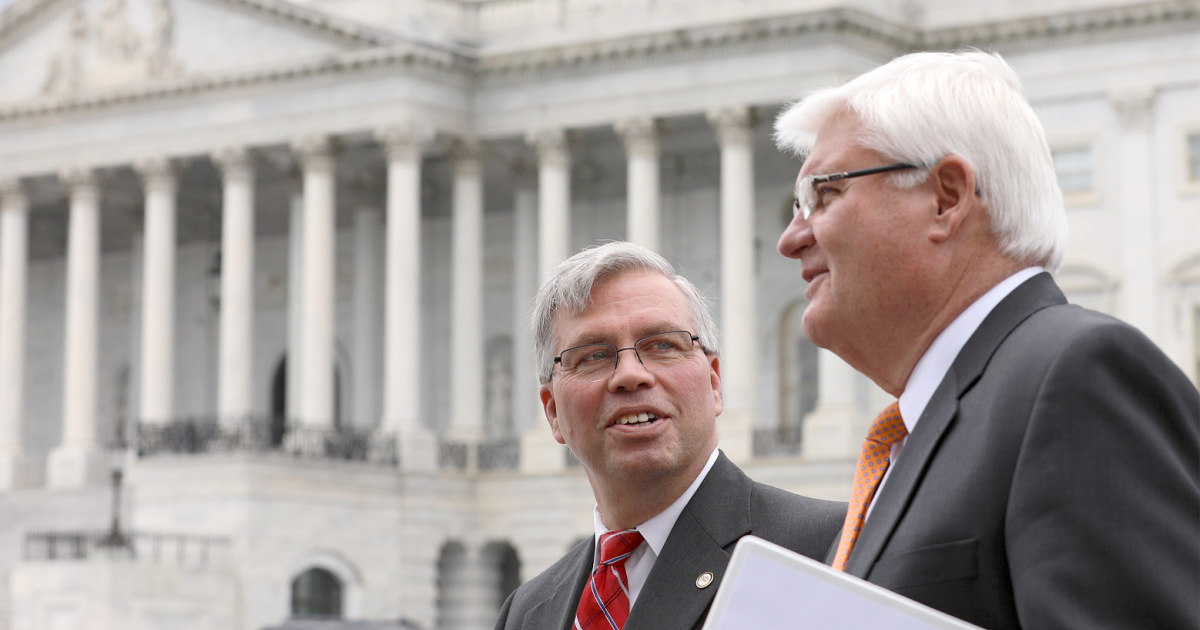Candid Conversation | Dale Moore, Executive Vice President, American Farm Bureau Federation
Posted on Jan 27, 2021
KFB Candid Conversation presents a discussion about the topical issues related to KFB priorities, the agricultural industry, and rural communities, in a question and answer format. In this column, Dale Moore, Executive Vice President, American Farm Bureau Federation, discusses working with a new administration coming to Washington and agriculture priorities in 2021.
Having spent several years in Washington working with lawmakers and administration officials on both sides of the aisle, what actions do you believe the new administration will take early on related to agriculture?
A key action that must be taken quickly to show attention and concern for agriculture will be to follow through on implementation of the COVID-19 assistance package finished in the final hours of the 116th Congress. There will also be significant attention focused on ensuring farmer, rancher, and worker safety in the agricultural and food supply chain.
I anticipate there will be several familiar faces among the political appointments made for agriculture and rural programs to show that President-elect (Joe) Biden appreciates and recognizes rural America. His early announcement of who he intends to nominate for the U.S. Trade Representative position shows that trade will be a focal point from day one.
There has been a lot of discussions in the ag community about issues that could be on the forefront of the new administration’s “to-do” list important to agriculture like trade, infrastructure, and the environment. What are some of the key points ag advocates need to make when it comes to these or similar topics?
An advantage of Farm Bureau’s grassroots policies and AFBF board of directors’ oversight of issues that are national and international in scope is that the key points do not change with the administrations.
International trade’s impact on virtually all agricultural commodities is well documented. For example, we’ve seen first-hand the disruption caused by China’s unfair retaliatory tariffs on our commodities and farm goods. We need fair trade and quick resolution of trade disputes and protection against non-tariff trade barriers.
On the infrastructure front, a key issue is emerging needs relative to technology, such as broadband. Addressing long-standing (and long-neglected) bridges, locks, dams, harbors, etc., that are critical to transporting vital inputs to the farm as well as moving commodities to market is also vitally important.
On the environmental front, we need to keep pushing for balance, collaboration, and consideration of the great work that farmers, ranchers, and livestock producers do day-in and day-out. Did you know that if we had tried in 1990 to produce the same amount of food we did in 2020, we would have needed 100 million more acres? That’s how much more productive farmers have become. They’ve also committed more than 140 million acres to conservation – more than the land mass of California and New York combined. There are many other examples I could cite, but the point is farmers and ranchers have long been committed to sustainability and are making impressive progress.
One area still begging for progress is ag labor. Demand for a legal, stable, and readily available workforce continues to grow, yet the solutions remain locked up in the legislative process. We need relief that is long-term and recognizes that farmers must be able to afford the solutions or they will be put out of business with the job losses that entails.

The House and Senate ag committees each have new leaders in the 117th Congress. How will this affect the work of both committees as we move forward in 2021?
While three of the four leadership positions on the authorizing committees will have new titles, the individuals certainly are not new to the committees, nor are they new to agriculture.
Our state Farm Bureaus in their home states have worked closely with them and have strong relationships back home. At the AFBF level, we’ve had the opportunity to work directly with them. Sen. John Boozman (R-Ark.) will be leader on his side and joins Sen. Debbie Stabenow (D-Mich.) who has served as both chair and ranking member. On the House side, Rep. David Scott (D-Ga.), the incoming chairman, has long-standing relationships with Georgia Farm Bureau leaders. This includes AFBF President Zippy Duvall, a former president of Georgia Farm Bureau. Rep. Glenn “GT” Thompson (R-Pa.), who will serve as Republican leader, has been a champion for farmers and livestock producers for many years, working closely with his home-state Farm Bureau.
Agriculture will also benefit from returning chairs in Senate and House Agriculture Appropriations subcommittees including Sen. John Hoeven (R-N.D.) and Rep. Sanford Bishop (D-Ga.).
Do you think the nomination of Tom Vilsack to reprise his role as USDA Secretary, someone with experience and someone Farm Bureau has worked with before, gives the ag industry an advantage?
Tom Vilsack returning to the Agriculture Cabinet position should provide farmers, ranchers, and rural communities with an advantage as the new administration transitions in. He has continually worked among farm, livestock, and commodity groups throughout his career, and, most notably, he spent eight years as secretary of agriculture under President Obama. In short, once confirmed by the Senate, he will be able to start running USDA on his first day. He knows the agencies, the career officials, and the broad scope of the department’s authorities.
What are some of the key issues Farm Bureau wants to address with the new administration?
Our issues of concern remain grounded in our grassroots policy and the key objectives outlined by AFBF’s board of directors in our Strategic Action Plan.
Protecting the regulatory relief gains achieved over the past four years is very important. The new water rule that replaced the WOTUS regulations is just one example. Continuing efforts to expand deployment of broadband technologies and service to rural areas, particularly underserved areas, is also critical.
Endangered Species Act reforms and related Western lands issues are also key. The federal government owns significant portions of our nation’s Western states. Federal controls and mandates have far-reaching impacts on the ability of ranchers and farmers to economically sustain their agricultural businesses.
Regulations and related reforms attendant to biotechnology, renewable energy sources, and technologies are also top-of-mind. And I have to mention trade. Congress does have a role, but the day-to-day management of trade – whether negotiating new agreements, optimizing existing ones or resolving trade disputes with foreign nations – lands squarely in the Executive Branch.
The key to success in all of these (and any additional issues) is to ensure that agriculture has a seat at the table as a full partner in the new administration’s agenda.
Is there any advice you could give Farm Bureau members as they prepare to continue their work as agriculture advocates with a new administration and new Congress?
There are 60-plus new U.S. representatives, at least eight new U.S. senators, and the wholesale filling of Executive Branch appointed positions. This provides opportunities to reach out and welcome newly elected and appointed federal officials, as well as touching base with those members of Congress that were re-elected.
I had the privilege of working in the House for well over a decade. The people I most enjoyed visiting with, the people I made sure to call back first, were those who had taken the time to reach out with a welcome and get-to-know-you visit. Then when the prairie fires popped up (a nearly daily D.C. occurrence) and a constituent or their organization called for help, it was not the first time we’d visited.
In my current role at AFBF, I would also note that while I have had a lot of opportunity to visit with elected and appointed officials, they all want to know “what the folks back home are saying or wanting.” Our grassroots members, county Farm Bureaus, and state Farm Bureaus are their constituents and who they are working for. Just like me.
Comments